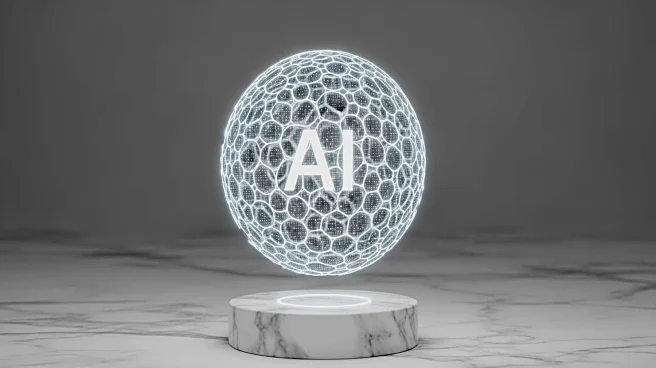What's Happening?
Goldman Sachs economist Joseph Briggs has released a note to clients asserting that the current level of investment in artificial intelligence infrastructure is sustainable. Despite fears of an AI bubble,
Briggs argues that the economic value promised by generative AI justifies the billions being spent on data centers and computing processing. He predicts that U.S. companies could generate up to $8 trillion in new revenue due to AI advancements. Other Wall Street figures, including JPMorgan Chase CEO Jamie Dimon, have echoed this sentiment, comparing AI's potential impact to that of the internet during the dot-com bubble. While some investors express concern over stretched stock valuations, Briggs maintains that the investment in AI infrastructure is sound, provided companies expect long-term returns.
Why It's Important?
The debate over AI investment is crucial as it could significantly impact the U.S. economy and stock market. If AI infrastructure investments prove sustainable, they could lead to substantial productivity gains and revenue growth for companies, potentially transforming various industries. However, concerns about a bubble suggest that some investors fear overvaluation, which could lead to market instability if expectations are not met. The outcome of this debate will affect stakeholders across the tech industry, financial markets, and broader economic sectors, influencing investment strategies and economic forecasts.
What's Next?
As AI technology continues to evolve, stakeholders will closely monitor its impact on productivity and revenue generation. Companies may adjust their investment strategies based on the perceived sustainability of AI infrastructure spending. Investors will watch for signs of overvaluation and potential market corrections. Regulatory developments and competitive dynamics will also play a role in determining the ultimate winners in the AI sector. The ongoing discourse will shape future investment cycles and technological advancements.
Beyond the Headlines
The AI investment debate raises ethical and societal questions about automation and job displacement. As companies increasingly adopt AI, there may be significant shifts in workforce dynamics, requiring retraining and adaptation. The long-term implications of AI on employment and economic inequality will be critical considerations for policymakers and business leaders.









